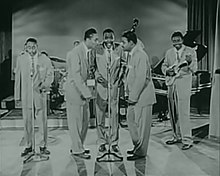The Clovers
| The Clovers | |
|---|---|
 |
|
| Background information | |
| Origin | Washington, D.C., United States |
| Genres | R&B, rock and roll, doo wop |
| Years active | 1946–present |
| Labels | Atlantic, United Artists |
| Members | Harold Winley King Raymond Green Franklen Poole Carlos Wilson Tyrone Burwell |
| Past members | John "Buddy" Bailey Harold Lucas Charlie White Matthew McQuater Bill Harris Billy Mitchell Thomas Woods Billy Shelton John Phillip Charles R. Stevens James "Toy" Walton Robert Russell Roosevelt "Tippie" Hubbard Nathaniel Bouknight Peggy Winley Mills Ann Winley Jimmy Taylor Daniel "Steep" Abbott Edward "Ike" Bowers Juan Hawkins Johnny Mason Ron Reace William Rawlings Antwan Drayton Prentiss Floyd Tye Lovell |
The Clovers are an American rhythm and blues/doo-wop vocal group who became one of the biggest selling acts of the 1950s. They had a top thirty US hit in 1959 with the Leiber and Stoller song "Love Potion No. 9".
The group was formed at Armstrong High School, Washington, D.C., in 1946 by Harold Lucas (baritone), Billy Shelton and Thomas Woods. Initially a trio, they expanded to a quartet with the addition of John "Buddy" Bailey (lead) and began calling themselves The Four Clovers. Billy Shelton was replaced by Matthew McQuater (tenor) in 1948. As The Four Clovers, the group started to appear at local amateur music shows including the WWDC amateur hour show hosted by Jack Lowe Endler at the Republic Theatre. This brought them to the attention of a wider audience including Harold Winley (bass) who, after hearing them on WWDC, decided to introduce himself to the group. By the end of 1948 Woods had been replaced by Winley. An introduction to Lou Krefetz, a record sales distributor who became their manager, led to their first recording session for New York's Rainbow Records and the release of one single in November 1950, "Yes Sir, That's My Baby" / "When You Come Back to Me". By the end of 1950 Bill Harris (b. April 14, 1925, Nashville, Tennessee) had joined as their guitarist; his blues- and jazz-inflected playing would become an integral part of their sound. Krefetz then brought them to the attention of Atlantic Records, which signed them in February 1951. The Clovers were immediately booked by the Shaw Artists agency to perform at the Apollo Theater in Harlem starting on February 15. A week later, on February 22, they went into the studio for their first recording session for Atlantic, which included the Ahmet Ertegun composition "Don't You Know I Love You"; that song, backed with the standard "Skylark", was their first top-ten R&B hit for the label and remained on the R&B chart for five months. Their second recording session resulted in the release of "Fool, Fool, Fool" in August 1951, which by September had reached #1 on the R&B chart. The Clovers' lead vocalist, Buddy Bailey, was drafted into the army at the end of August 1951 and John Phillip was brought in to replace him. Philip was soon replaced by Charlie White (b. 1930, Washington, DC), who had been in the vocal groups The Dominoes and The Checkers. The tracks "One Mint Julep" (written by Rudy Toombs) and the Ertegun composition "Middle of the Night" (originally released as a 10" vinyl single) were both top ten hits on the R&B chart of May 1952. Their next release, "Ting-A-Ling", peaked at #2 on the Billboard R&B chart (September 1952) and reached #1 on the Billboard Juke Box R&B chart. They followed up this early success with a string of R&B hits, including "Hey Miss Fannie" / "I Played The Fool" (released October 1952), "Good Lovin'" (top ten R&B hit November 1953) and "Little Mama" / "Lovey Dovey" (recorded September 1953 with Charlie White on lead vocals). By the end of 1953 White had been replaced by Billy Mitchell. Buddy Bailey was discharged from the army in May 1954 and rejoined the group. The releases "I've Got My Eyes On You" and "Your Cash Ain't Nothin' But Trash" (with Billy Mitchell on lead vocals) featured in the top 30 best-selling R&B records of 1954, with "Lovey Dovey" proving to be the most successful Clovers release of that year.
...
Wikipedia
